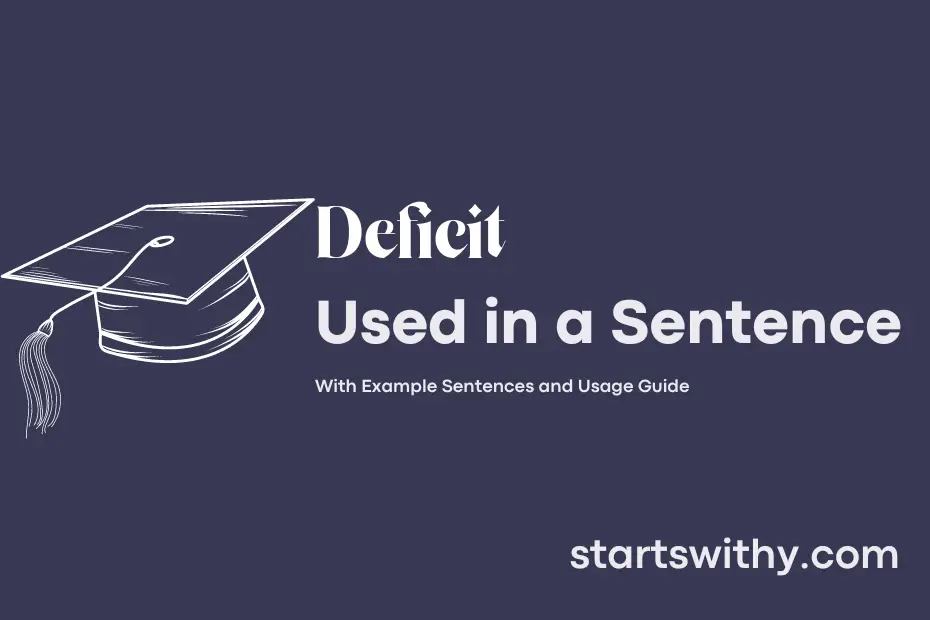Ever found yourself puzzled by the term “deficit” in financial discussions? A deficit occurs when expenses exceed income, resulting in a shortfall or negative balance. This imbalance can have significant implications for individuals, businesses, and governments alike.
Understanding deficits is crucial for sound financial management. By grasping the concept of deficits, one can make informed decisions to address the shortfall effectively. Whether it involves cutting expenses, increasing income, or seeking outside assistance, managing deficits requires careful planning and deliberate actions.
7 Examples Of Deficit Used In a Sentence For Kids
- Deficit means not having enough of something.
- We can try to fix our deficit by saving more money.
- Eating healthy foods can help us avoid a nutrition deficit.
- If we don’t practice counting, we might have a math deficit.
- It’s important to ask for help when we have a deficit in understanding something.
- Reading books can help us improve a vocabulary deficit.
- Let’s work together to overcome any learning deficit we may have.
14 Sentences with Deficit Examples
- Deficit in sleep hours can impact your cognitive abilities and overall academic performance.
- Make sure to prioritize a balanced diet to avoid any deficit in essential nutrients like vitamins and minerals.
- Managing your time effectively can help you avoid a deficit in completing assignments before the deadline.
- Regular exercise can boost your energy levels and help you combat deficit in physical fitness.
- Seeking help from tutors or study groups can assist you in addressing any deficit in understanding complex topics.
- It’s important to stay organized to prevent a deficit in keeping track of important deadlines and events.
- Developing good study habits can reduce the deficit in retaining information for exams.
- Maintaining a healthy work-life balance is crucial to prevent a deficit in mental well-being.
- Setting realistic goals can help you avoid a deficit in motivation during challenging times.
- Prioritizing self-care activities can prevent a deficit in mental and emotional health.
- Utilizing resources like libraries and online databases can help you overcome a deficit in research material for projects.
- Participating in extracurricular activities can prevent a deficit in building a well-rounded resume for future opportunities.
- Building a strong support system can help you cope with any deficit in emotional resilience during stressful periods.
- Engaging in internships and networking events can offset the deficit in gaining practical experience for your chosen career path.
How To Use Deficit in Sentences?
When Deficit is used in a sentence, it typically refers to a shortage or lack of something, especially in terms of finances or resources. Here is a guide on how to use Deficit in a sentence for beginners:
-
Identify the context: Determine what type of deficit you are referring to. Is it a budget deficit, trade deficit, or some other form of lacking?
-
Choose the correct form: “Deficit” is usually used as a noun, so make sure you are using it in the right context within your sentence.
-
Construct your sentence: Start by introducing the subject or idea that is experiencing the deficit. For example, “The country is facing a significant budget deficit this year.”
-
Provide additional information: To further clarify the deficit, you can include details such as the amount, cause, or impact. For instance, “The trade deficit with China continues to grow each month.”
-
Review and revise: Before finalizing your sentence, review it to ensure that Deficit is used correctly and that the sentence effectively communicates the intended meaning.
By following these steps, beginners can effectively incorporate Deficit into their sentences to convey the concept of a shortage or inadequacy in various contexts.
Conclusion
In conclusion, the sentences that illustrate the concept of deficit highlight a lack or insufficiency in various contexts. Whether referring to budget deficits in government spending, trade deficits, or deficits in resources, these sentences emphasize a shortfall or gap that needs to be addressed. By highlighting deficits, these sentences underscore the importance of finding solutions to overcome limitations and achieve balance. From economic policies aimed at reducing deficits to efforts to bridge deficits in education or healthcare, these examples show the impact of deficits on various aspects of society.
By showcasing the implications of deficits in different scenarios, these sentences serve as a reminder of the challenges posed by imbalances and shortcomings. Understanding deficits is crucial for designing effective strategies to address these issues and foster progress. Through targeted interventions and proactive measures, deficits can be managed and minimized, paving the way for a more stable and equitable future.



